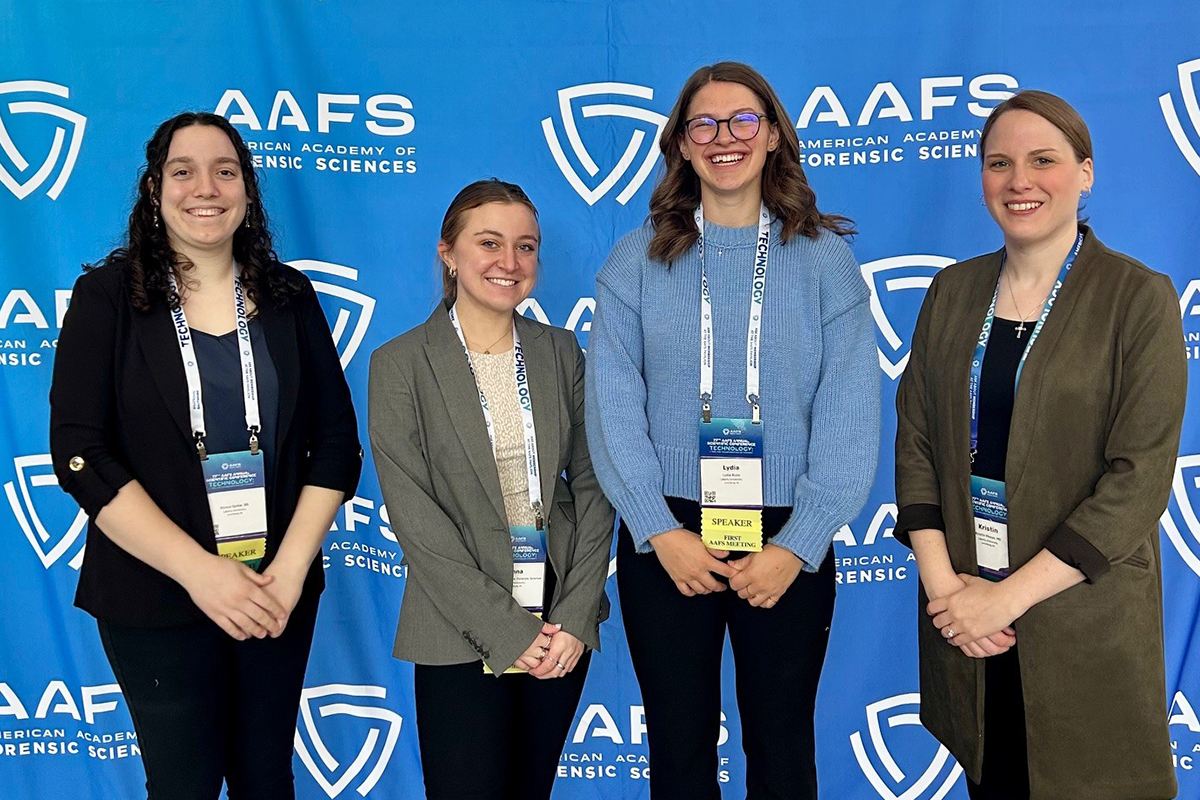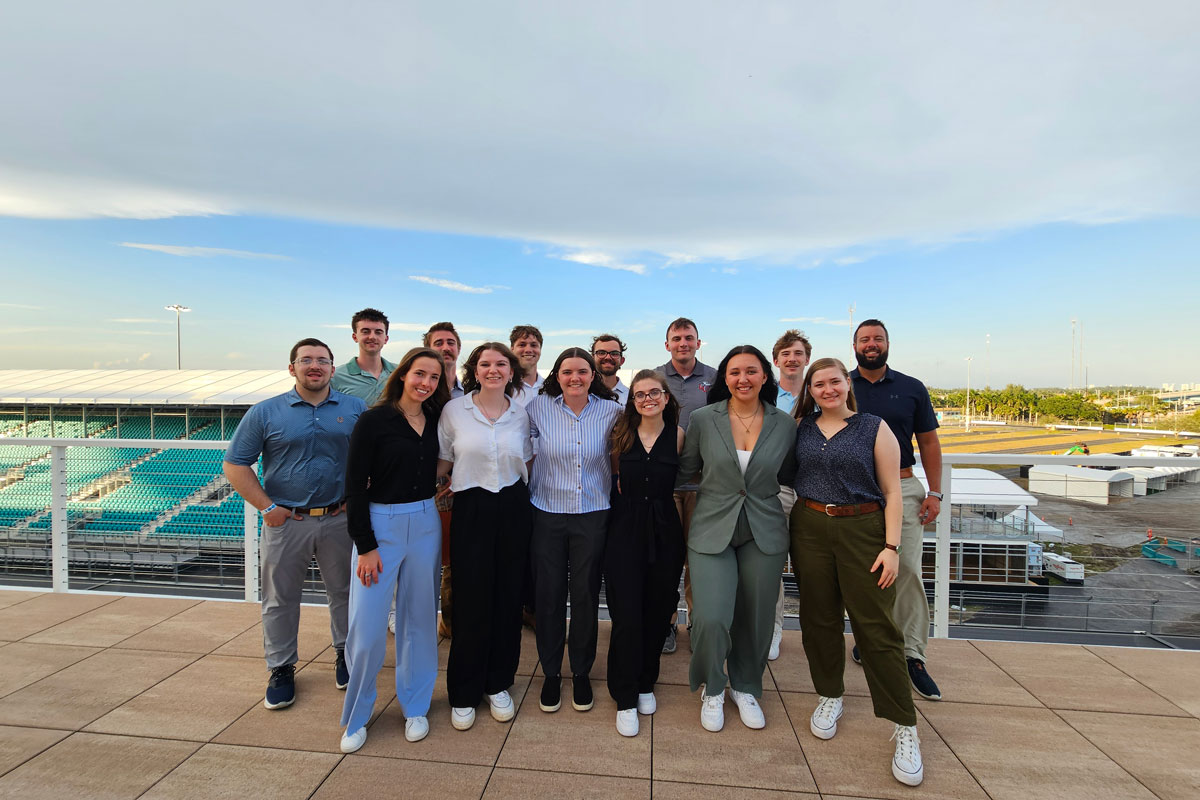Search News Archives
Filter News Articles
Additional Navigation
Forensic science students present research from Civil War-era DNA testing to bullet casings and fingerprinting at AAFS conference
February 28, 2025 : By Ryan Klinker - Office of Communications & Public Engagement

Three Liberty University forensic science students presented intriguing research with applications for crime scene investigation during the annual American Academy of Forensic Science (AAFS) conference, a gathering of students and professionals from the United States and around the world.
From Feb. 17-22 at the Baltimore Convention Center, the students and Professor Kristin Mossé, a faculty mentor for two of the projects, shared their own findings while also learning more about the forensic field.
“This was a really great experience because the students get to present their research to current professionals in the field who can give feedback and direction,” Mossé said. “The students were also able to attend the different talks and sessions by these professionals, and that made for a great opportunity for networking and seeing everything that’s out there happening in the field.”
Mossé mentioned One notable speaker was John Butler, an internationally recognized expert in forensic DNA analysis that has authored many books forensic DNA scientists use for training. Another notable session talked about the deep ocean recovery and DNA identification of the human remains from the Titan submersible incident in 2023.
Senior Alyssa Spillar presented on DNA tests she helped conduct on a blood-stained table from a Civil War field hospital at the historic Hillsman House in Rice, Va.
“Not only was I able to share my research and represent Liberty University, but I also had the opportunity to hear from experts and researchers in the field,” Spillar said.

“The conference showcased a wide range of disciplines, and I gained valuable insights across various areas of study. Additionally, I received some constructive feedback on my research and had the chance to network with a few professionals in the industry.”
The Hillman House project, which has been an ongoing project for students since 2018, received a 2024-2025 ILLUMINATE grant from the Office of Sponsored Projects & Research that will fund a DNA kit that is akin to what is used by the Virginia Department of Forensic Science labs.
Senior Anna Sommerville presented the findings of a study on various gun casings with unknown origins. Beginning last May as part of the ASSURE program, Sommerville was tasked with examining and classifying hundreds of bullet casings donated to the forensic science program. She used casings from various firearms provided by the Liberty Mountain Gun Club to find matches.
The project was Sommerville’s first experience in college research. After shadowing members of the Richmond Police Department and visiting homicide scenes, she developed an interest in crime scene investigation and applications for the project.
“My professors had wanted to start a firearms tool marks research project in the forensic laboratory, because we hadn’t done anything like that before, and I said I’d love to do it,” she said. “I’ve always been intrigued by how they can trace cartridge casings found at crime scenes back to a firearm, so I wanted to see if that was something I’d be interested in doing professionally. Being able to go into the forensic lab, which I wouldn’t typically have access to, was really cool for me. It made everything more real, and I’ve been able to learn how forensic labs operate.”
Senior Lydia Buxa shared about her work to enhance the formulation of lanconide fingerprint powder (a standard white powder used for latent print development) in order to produce more effective forensic techniques. Under the direction of Professor of Chemistry Dr. Chad Snyder in Fall 2023, Buxa found that the best quality prints occurred when titanium oxide was not added to the lanconide mixture.
Participating in the conference was “enriching,” Buxa said, adding that she felt blessed to be able to interact with and glean from professionals and peers.
“I got to spend three days learning not only more about these amazing forensic techniques and research projects but also more about how I could improve my own methods,” she said. “My actual presentation experience was daunting at first, but it pushed my confidence in my research and knowledge.”
The opportunity to attend the conference was more than the honor of presenting one’s work, Sommerville said, as it also encouraged her in her future pursuits.
“I feel like sometimes in forensics it can be very overwhelming to get your foot in the door, because it’s becoming a competitive field, and it could be overwhelming just deciding what discipline you want to go into,” Sommerville said. “Having my research accepted by AAFS and getting to go was very encouraging for me. It was really cool being around thousands of other people from all over the world who share my same passion for forensic science and justice.”
Travel and meals for the group were funded by Liberty’s Office of Sponsored Projects & Research and the Department of Biology & Chemistry. Mossé said the students’ projects would not have been possible without the leadership of Director of Forensic Science Dr. J. Thomas McClintock.


